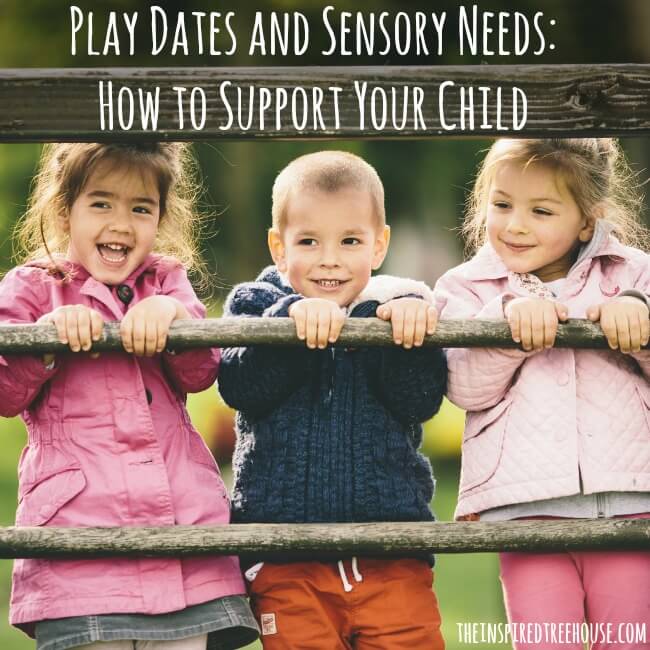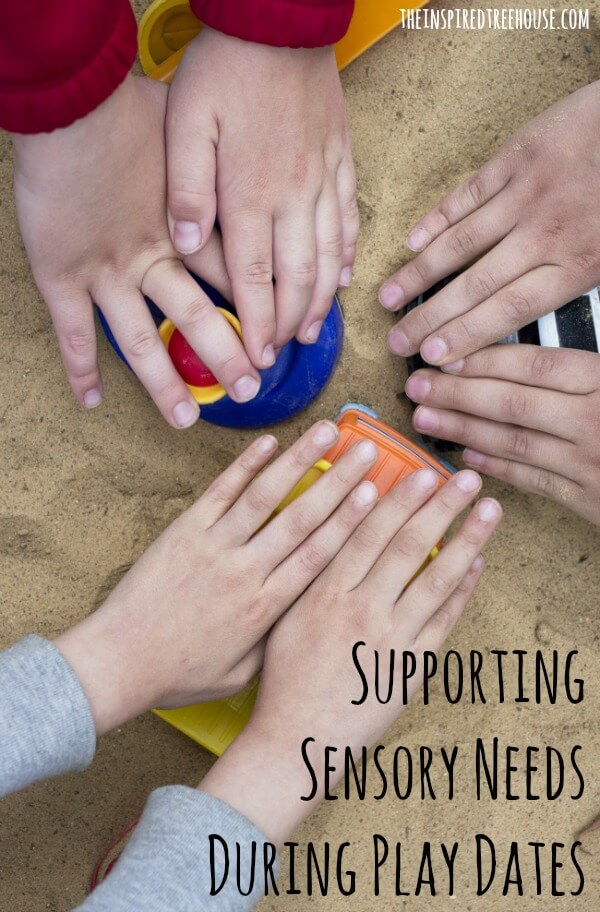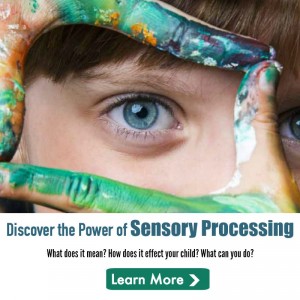Today, we’ll be talking about how to support kids with sensory issues during play dates with friends!
For kids who have problems with sensory processing, social interactions with other kids can be tough. Going to a friend’s house for a play date or having a friend over to play may seem like an insurmountable feat for a child who has hypersensitivities or for a child who seeks out sensory input through rough play.
Even though sensory behaviors can definitely make social interactions more challenging, there are ways to support kids to create positive play experiences with peers despite sensory processing needs. Here are some ideas:
1 || Schedule Smart
Choose the day and time of your play date wisely. Most children (with or without sensory needs) tend to have a time of day when they are at their best. This is your best opportunity to allow your child to shine!
Also consider the day of the week. Is your schedule packed with appointments, lessons, pick-ups, and drop-offs? Don’t try to squeeze a play date in too. Shoot for scheduling your play date on a day that is otherwise free and easy.
Keep it flexible. Saying “We’ll be there between 9 and 10” might be a better bet than committing to an exact time. This gives you some wiggle room to manage any meltdowns and to make a smooth transition.
2 || Encourage Smooth Transitions
Check out these simple transition strategies to help your child make the move from home to the play date without a meltdown. You can also use these strategies during the play date as the kids move from one activity to the next and at the end of the play date to signal that the interaction is over.
3 || Provide Structure
If you’re the one hosting the play date, it may be helpful to provide a loose schedule of events to help your child feel safe, secure, and prepared for what’s coming next. Allow your child to help you write down or draw pictures of a simple schedule of events. Be careful not to tie yourself to very specific play activities…inevitably, things will not go as planned and this could lead to a meltdown. Instead, make a general timeline. For example: First – play downstairs Next – snack time Last- play outside

4 || Use Your Tools
Most parents of children with sensory needs know innately what to do to support and help calm their kids. Oral sensory toys, tactile activities, visual sensory bottles, jumping/crashing, swinging – why not make them part of the play date?
If you’re going to someone else’s house, throw a few tried and true favorites into a backpack and tell your child that she can share them with her friend! If you’re hosting a play date, try suggesting the sensory activities that help calm and regulate your child as play activities. Tactile bins, calming snacks, and movement games are all great options. Whether they have sensory needs or not, most kids love sensory exploration and play!
5 || Talk it Out
During my classroom therapy groups at school, I’m always so impressed by how kids just seem to “get it” when I explain other kids’ sensory needs. Whenever the opportunity presents itself, try being open with your child’s friend about what she needs and why. For example, “Jane is going to do some jumping and crashing into the pillows because it helps her calm her body down. Do you want to try too?”
6 || Establish a Break Space
Before the play date begins, talk with your child and establish a quiet space or “break space”. This isn’t to be used as a “timeout” or punishment, but as a voluntary choice the child can make if he needs a break in the action.
7 || Choose Your Location Wisely
Rather than playing at your house or a friend’s house, what about meeting up at a favorite place that is already designed to meet your child’s sensory needs? A playground, a hiking trail, or the pool might be great options for kids who need to move, while the library, a nature center, or a museum might be better for kids who are successful in quieter, less active surroundings.
8 || Prepare, Prepare, Prepare
Talk to your child ahead of time about the sensory experiences that commonly trigger meltdowns for him (e.g. loud noises, messy activities) and about how he can appropriately get the input his body needs during the play date. Come up with backup plans and ideas for appropriate responses to different scenarios (e.g. what to do if there is a loud sound, what to do if there is a food you don’t like, what you can do instead of tackling/pushing).
9 || Ask the Experts for Help
For children with very severe sensory processing problems who demonstrate significant sensory behaviors, it may be more appropriate to look into a therapeutic social skills group through an occupational therapist and/or speech language pathologist.
Looking for more great information about sensory processing? Check out our book, Sensory Processing 101!
And check out Social Skills for Kids, an awesome resource packed with more than 75 fun and engaging games and activities for building relationships, social problem solving skills, and communication!

Latest posts by Claire Heffron (see all)
- Cute Zipper Bags for Therapists - April 18, 2024
- Fairy Tale Games and Toys - April 12, 2024
- The Best Emotional Regulation Books for Kids - April 8, 2024



[…] to Spread the Work, Share a book for Sensory Awareness Month. Be sure to check out Claire’s suggestions for creating a positive environment for everyone involved in your playdates. We also showed you a few fun ways to teach your kids their phone numbers and got everyone […]